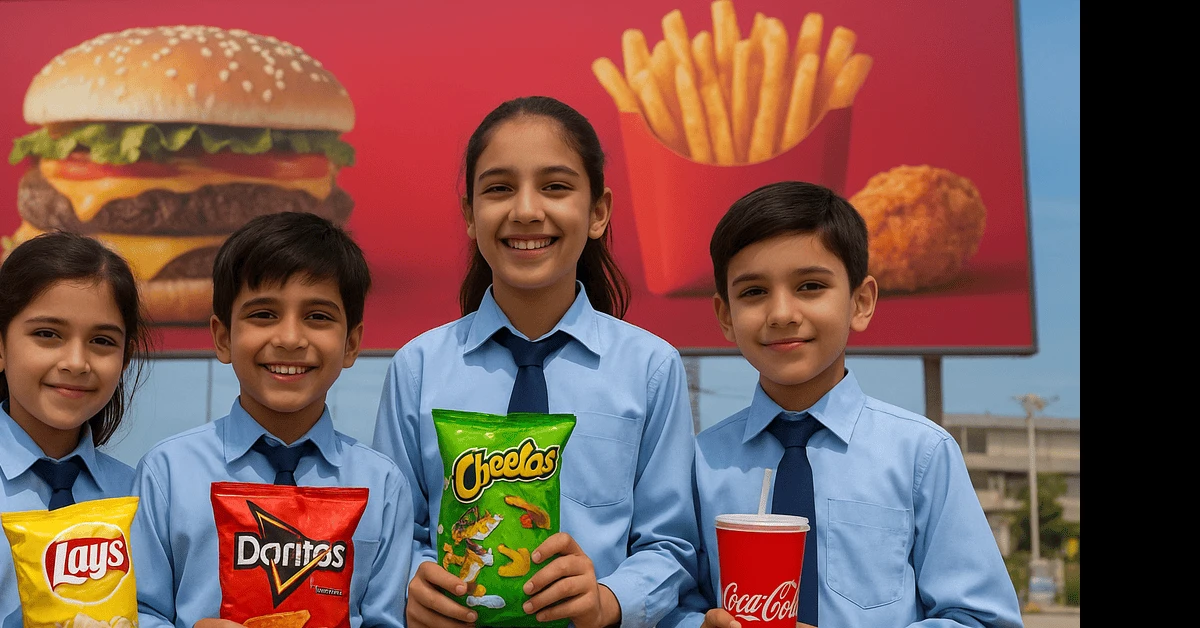Last Updated: October 1, 2025
How Junk Food Ads Are Targeting Pakistani Children More Aggressively Than Anywhere Else

In Pakistan, every cricket match, cartoon break, and school event seems to have one thing in common: junk food advertisements. From burgers to chips to fizzy drinks, children are bombarded with flashy ads that make unhealthy food look fun, exciting, and “cool.” What’s shocking is that these ads target Pakistani children far more aggressively than kids in many other countries.
The Psychology Behind Targeting Children
Marketers know that children are easy to influence. Bright colors, catchy jingles, cartoon mascots, and free toys tap into their emotions. Kids don’t just ask for these products—they pressure parents into buying them. In marketing terms, this is called “pester power,” and junk food companies exploit it to the maximum.
Why Pakistan Is Hit Harder Than Other Countries
- Weak regulations: Unlike countries where junk food ads during children’s programs are banned, Pakistan has almost no restrictions.
- School sponsorships: Fast-food chains and snack brands sponsor events, distribute free samples, and even advertise inside schools.
- Unrestricted digital ads: Pakistani children watch cartoons and YouTube videos with almost no ad filtering, making them easy targets for food marketing.
- Media dependency: TV channels heavily rely on junk food brands for revenue, so there’s little incentive to challenge them.
The Hidden Cost on Children’s Health
The rise in childhood obesity, early diabetes, and poor nutrition among Pakistani children isn’t a coincidence. Doctors report that they are seeing more health issues in children linked directly to processed food consumption. Yet, many hesitate to speak against the powerful food industry that often sponsors medical events and conferences.
The Role of Schools and Parents
Schools sometimes partner with fast-food brands for marketing deals, while parents—often unaware of the long-term health impact—find it easier to give in to their kids’ demands. This creates a cycle where children grow up normalizing junk food as a part of everyday life.
Why the Silence?
One of the biggest reasons junk food ads go unchecked in Pakistan is money. Advertising brings in huge profits not just for the brands but also for TV channels, influencers, and event organizers. Government regulators, meanwhile, have yet to draft or enforce meaningful laws restricting junk food ads aimed at children.
Learning From Other Countries
Countries like the UK, Chile, and Australia have already banned junk food ads during children’s programming. In some nations, cartoon characters can’t be used to promote unhealthy snacks. If Pakistan adopts similar measures, it could reduce childhood obesity and set healthier habits early on.
Conclusion
The junk food industry in Pakistan has discovered its most profitable customer base: children. Without stricter laws and stronger parental awareness, this cycle will continue to harm future generations. The question is—will Pakistan step up to protect its children, or will junk food giants keep winning?
FAQs
1. Why are junk food ads dangerous for children?
They influence children’s eating habits, making them crave unhealthy foods that lead to obesity, diabetes, and other long-term health problems.
2. Do other countries restrict junk food advertising to children?
Yes, many countries have strict laws banning junk food ads during children’s programming and restricting marketing tactics like cartoon mascots or free toys.
3. What can parents in Pakistan do to protect their kids?
Parents can limit screen time, educate children about healthy food, and avoid giving in to constant demands created by aggressive advertising.
4. Why doesn’t Pakistan have laws against junk food ads?
Currently, there are no strong restrictions because of industry influence, lack of awareness, and the heavy reliance of media on ad revenue from food companies.
5. What steps can schools take?
Schools can ban junk food sponsorships, avoid selling processed snacks on campus, and run awareness programs about healthy eating.
You May Also Like:

How Pakistanis Self-Medicate More Than Any Nation: The Dangerous Pharmacy Culture...

How Your Smart TV Spies on You More Than Your Smartphone...

Why Storage Speed Matters More Than RAM After 2–3 Years of Phone Use...

Pakistani Monsoon Flood Crisis 2025: Current Impact, What to Expect & How to Stay Safe...

